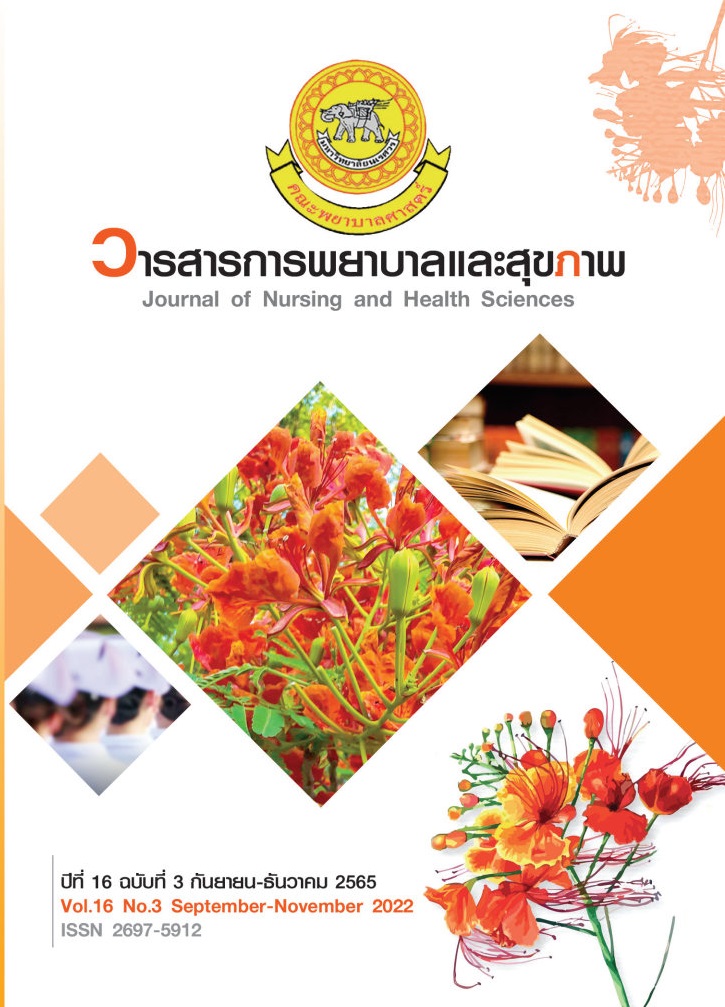ปัจจัยที่มีความสัมพันธ์กับทักษะการเรียนรู้ในศตวรรษที่ 21 ของนิสิตพยาบาล มหาวิทยาลัยนเรศวร
Main Article Content
บทคัดย่อ
การวิจัยเชิงพรรณนาแบบหาความสัมพันธ์นี้มีวัตถุประสงค์เพื่อศึกษา 1) ปัจจัยด้านผู้เรียน ผู้สอน การจัดการเรียนการสอน และสิ่งสนับสนุน และ 2) ทักษะการเรียนรู้ในศตวรรษที่ 21 ตามการรายงานของนิสิตพยาบาล และ 3) หาความสัมพันธ์ระหว่างปัจจัยดังกล่าว กับทักษะการเรียนรู้ในศตวรรษที่ 21 ของนิสิตพยาบาล มหาวิทยาลัยนเรศวร กลุ่มตัวอย่างเป็นนิสิตพยาบาล ชั้นปีที่ 3 และ 4 ที่กำลังศึกษาในปีการศึกษา 2564 จำนวน 159 คน เครื่องมือวิจัยได้แก่ แบบสอบถามปัจจัยด้านผู้เรียน ผู้สอน การจัดการเรียนการสอน และสิ่งสนับสนุน และแบบสอบถามทักษะการเรียนรู้ในศตวรรษที่ 21 ซึ่งหาความตรงตามเนื้อหา ได้เท่ากับ 1.0, .97, 1.0, 1.0 และ .99 ตามลำดับ และหาค่าสัมประสิทธิ์แอลฟาของครอนบาค ได้เท่ากับ .83, .92, .93, .91 และ .93 ตามลำดับ วิเคราะห์ข้อมูลโดยใช้สถิติบรรยาย และสัมประสิทธิ์สหสัมพันธ์สเปียร์แมน
ผลการวิจัย พบว่า ทักษะการเรียนรู้ในศตวรรษที่ 21 ของนิสิตพยาบาล โดยรวมอยู่ในระดับสูง ( = 4.16, S.D. = .40) ปัจจัยด้านผู้เรียน ผู้สอน การจัดการเรียนการสอน และสิ่งสนับสนุน ตามการรายงานของนิสิตพยาบาลทุกด้านอยู่ในระดับสูง ( = 4.21, S.D. = .46, = 4.16, S.D. = .49, = 4.11, S.D. = .48 และ = 3.96, S.D. = .59 ตามลำดับ) และปัจจัยทุกด้านมีความสัมพันธ์ทางบวกกับทักษะการเรียนรู้ในศตวรรษที่ 21 อย่างมีนัยสำคัญทางสถิติ (p < .001) โดยปัจจัยด้านผู้เรียนมีความสัมพันธ์อยู่ในระดับมาก (r = .73) ส่วนด้านผู้สอน การจัดการเรียนการสอน และสิ่งสนับสนุน มีความสัมพันธ์อยู่ในระดับปานกลาง (r = .62, .61 และ .57 ตามลำดับ)
Article Details

อนุญาตภายใต้เงื่อนไข Creative Commons Attribution-NonCommercial-NoDerivatives 4.0 International License.
เอกสารอ้างอิง
Armpat, C., Pisaipan, P., Tarmong, C., Suwannarat,
K., Netgrajang, C., & Chonlatankampana, W.
(2018). Factors correlated with perception
toward 21st century learning skills among
nursing students, PhrapokklaoNursing
College. Journal of PhrapokklaoNursing
College. 29(2), 36-46. [In Thai].
Chooha, U., Somchoe, P., Naksukhum, S.,
Poungsarmai, P., Prayoonsirisak, R.,
& Mongkolsawad, J. (2019). How to produce
nursing to meet the needs of graduate user
in the 21st century: Challenges of Thai nurs
ing instructors. Mahasarakham Hospital
Journal, 16(2), 176-186. [In Thai] .
Faculty of Nursing, Naresuan University. (2021).
Self-assessment report, Bachelor of nursing
program. Faculty of nursing, Naresuan
university. [In Thai].
Kaewmanee, C. (2019). 21st Century skills of the
undergraduates Boromarajonani College of
Nursing Sunpasitthiprasong.
Journal of Health Sciences of Boromarajon
naniCollege of Nursing, Sunpasitthiprasong,
(3),11-27. [In Thai]
Ministry of Education. (2017). National education
plan 2017-2036. Bangkok: Prigwhan Graphic.
[In Thai].
Panich, V. (2012). The way to create learning in
the 21st century. Bangkok: Sodsrisaritwong
Foundation. [In Thai].
Partnership for 21st CenturyLearning (P21): A
Network of Battelle for Kids. (2019). Frame
work for 21st century learning
definitions. Retrieved 6 April 2021 from
https://static.battelleforkids.org/documents/
p21/P21_Framework_Brief.pdf
Pengpit, P., Sukjairungwattana, T., & Chantaranam
choo, N. (2020). The factors relations the
st century skills of undergraduate student's
Kasetsart University KamphaengSaen
campus. Journal of Education Silpakorn
University. 18(1), 319-338. [In Thai].
Petchkong, J. (2016). Causal factors affecting to
learning outcome of nursing students:
Boromarajonani College Nursing, Chakriraj.
Earthen Asia University Heritage Journal
Science and Technology, 10(2), 199-211.
[In Thai].
Saraketrin, A., Rongmuang, D., & Chantra, R. (2019).
Nursing education in the 21st Century:
competencies and roles of nursing instructors.
Journal of the Royal Thai Army Nurses, 20(1),
-20. [In Thai].
Srisatidnarakul, B. (2010). The methodology in
nursing research. Bangkok: U & I Inter
Media. [In Thai]
Sroysing, K. (2020). Factors affecting learning and
innovation skills in the 21st century of the
students at the Dusit Thani
College. Dusit Thani College Journal. 14(2),
-501. [In Thai].
Suwannakeeree, W., Jullmusi, O., Boonpracom, R.,
& Wongwiggan, S. (2022). Nursing teaching
and learning management during the
Coronavirus Disease 2019 pandemic: A case
study of the Faculty of Nursing, Naresuan
University. Journal of Nursing and Health
Sciences, 16(2), 1-13. [In Thai].
Suwannakeeree, W., Suwannaosod, S., Chairat,
R.,Chaiem, O., & Tongsaard, T. (2019).
Exploring 21st Century Learning Skills of
Nursing Students, Naresuan University.
Journal of Nursing and Health Sciences,
(1), 89-98. [In Thai].
Sriprom, C., Rungswang, A., Sukwitthayakul, C.,
& Chansri, N. (2019). Personality traits of
Thai Gen Z undergraduates: Challenges in
the EFL classroom. PASAA, 57, 165-190.
Yamane, T. (1973). Statistics: An introduction
analysis (2nd ed.). New York: Harper & Row.


